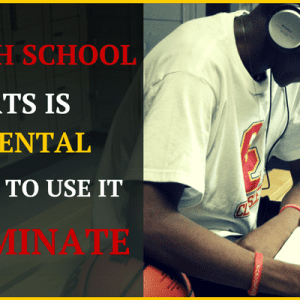 https://classlete.com/wp-content/uploads/2017/06/Why-High-School-Sports-Is-90-Mental-and-How-To-Use-It-To-Dominate-the-Competition-300x300.png
https://classlete.com/wp-content/uploads/2017/06/Why-High-School-Sports-Is-90-Mental-and-How-To-Use-It-To-Dominate-the-Competition-300x300.png
You may ask the question, “Is High school sports 90% mental?”.
Like Lebron James, Tom Brady and many high school athletes around the world, we have all heard our coach continually etch in our minds the following during a game or practice:
“C’mon, read and react!”
“Be poised and have composure!”
“Guys, focus and concentrate!”
Sound like your coach?
One of the most often used statements in athletics is that “Sports is 90% mental”.
The Cerebral Athlete Classlete Type would best exemplify the fact that sports is 90% mental.
However, when student athletes focus nearly 100% of their time working on the physical aspects of their game, why do they neglect the one fact that typically separates successful high school athletes from those who do not reach their full potential?
The fact remains that sports are indeed 90% mental.
Some would argue it even makes up a greater percentage. Simply put, our thoughts dictate our actions and our actions dictate our thoughts, both on and off the field of play.
Here is a great infographic about mental resiliency in sports with quotes from professional athletes. One quote stands out as:
“My mind is my biggest asset. I expect to win every tournament I play.
– Tiger Woods
So if you’re mind is going to be your biggest asset, how can you use it to dominate the competition?
Use Mental Imagery
Mental Imagery is a form of a mental rehearsal and visualization technique where athletes can imagine themselves completing a particular task without physically being in the environment to sense that they are doing it.
All great athletes use mental imagery alike, and the above quote from Tiger Woods is an example of putting it to good use.
Good mental imagery is put into practice when you put all 5 of your senses into the mental visualization as well as your internal emotions into completing a task. For example, if you have trouble at the free-throw line in basketball, consider thinking about:
- The taste of water or a sports drink you had previously during the timeout
- The tactile feeling of holding the basketball as it spins in your hands
- The silence in the gymnasium as everyone awaits in anticipation
- What the scoreboard, crowd and your coaches face would look like
- The smell of the thick but stifling oxygen in the air
- The tension of the moment coupled with your heartbeat as you drain the game-winning shot
The more mental and physical sensors you can use in your mental imagery, the better.
The more you do it, the better the results in reality.
Learn From Your Mistakes
Learning from your failures or mistakes is important because we benefit from seeing what went wrong in athletic performance, the classroom or social life.
Here are 3 things to consider when learning from making mistakes:
- Self-Assessment – Whether you made a bad decision off the field of play that led to being distracted while playing in a game (i.e. failing to study for a test and knowing your results will be poor), usually a self-assessment of the situation will produce obvious revelations about what mistakes you made in the first place.
- Other Alternatives – A question such as “Could I have done anything better?” can help you think of alternative thoughts or actions that may have yielded a more favorable result.
- Adapt – Once you have done a self-assessment of the situation and thought out some suitable alternatives, you will now be better equipped the next time you are faced with that situation. Simply put into action what you have learned and make the necessary adjustments the next time around.
Take It One Step At a Time
Building mental toughness is pivotal to any aspect of your life, particularly in sports.
Have you ever been in a workout, race or game and found yourself completely, 100%, without a doubt out of gas? Of course you have. So what did you do?
Most of us probably eased off the gas pedal, while others stopped and took a break.
The trick is to not focus on the overall workout, race or game but on the small battles in between – one step at a time. Whether it’s the final rep to get your conditioning coach of your back, or the last kilometer of a race or a final defensive stop at the end of the game, often breaking it down into smaller chunks will give you a winning mindset to conquer.
High School Sports 90% Mental? Yup
So the moral of the story here is quite simple. Give your mental game as much or more attention as your physical game through leveraging mental imagery, learning from your mistakes and taking it one step at a time.
Work hard, but equally work smart and you will learn how to dominate the competition.
Tell us in the comment section below, what mental tactics do you use to give yourself a competitive edge?
Join us on this journey as we are committed to supporting and helping the next generation of student athletes become the top of their class both on and off the field.
So to start, if you have not done so already, be sure to create your profile on Classlete.com for more access and begin your journey to balancing school, sports, and your social life today.
#BalanceItAll
#ImAClasslete
-The Classlete Team






